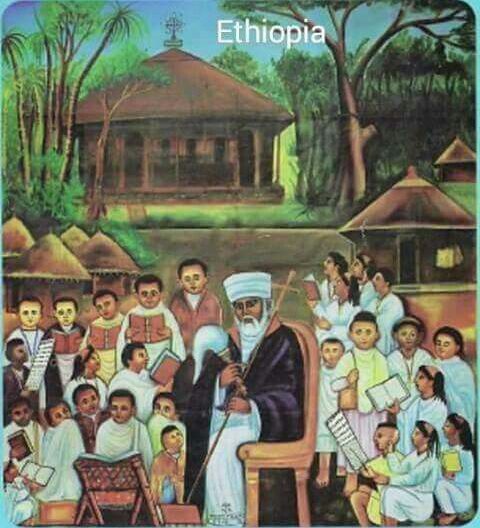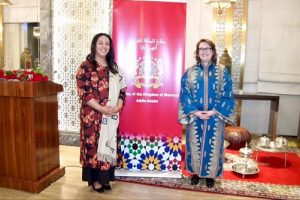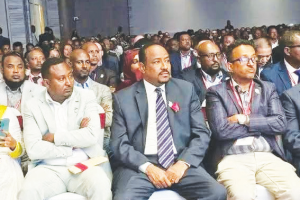
I remember our priest school in one of the neighborhoods of Gulele area and the yeneta (teacher) who was unfortunately lame in one leg and used a stick to walk. Our “school” was located in a compound that presumably belonged to one of the richest persons in the village who allowed the yeneta to gather a few children under the shadow of a big tree and teach us the basics of the Amharic alphabets and passages and prayers from the scriptures of the orthodox Church we learnt by rote.
We sat on big stones that served us as chairs and we fought among ourselves to occupy the stones every time we return to the open air school under the tree. The teacher was a severe disciplinarian who did not think twice before punishing a boy who went astray or failed to repeat the alphabets by heart as it was the rule then. The yeneta would lash with a twig those boys and girls who fail to live up to his strict standards. At the end of the school day we sang his praises saying: “Let honey mead flow down yeneta’s throat/ Let the dregs flow down our throat!”
On average, we spent a year or so learning the Amharic alphabets and the scriptures at the end of which we repeat passages from the Dawit (Holy book) by heart to prove our mastery of the curriculum. The following year we went to the nearest government school to register for grade one. The yenteta recruited new students for his open-air school.
Mothers usually bring their children to him and beg him to take care of their education. He was like a father to the children the moment he admits them to his open air school. In case a child proves incorrigible, he went to his mother and discussed the child’s behavior and eventually found a solution.
“Yekes timirt bet” or priest schools were set up in the open air or in makeshift rooms inside churches. The students strictly adhered to the codes of conduct of the church which also that of the yeneta. They say prayers every day and sing in church choirs. Those who are seven or older fast during the sixteen day fasting of Filseta which starts on the first of Nehassie and ends after sixteen days. The students held the teacher in high esteem and bow every time they cross his path and rush to kiss his bare foot pushing and shoving to be the first for the privilege.
Critics of the current Ethiopian educational system often describe it from two main perspectives. On the one hand the educational system is criticized for its failure to produce competent citizens able to carry out the development objectives of their nations, who are free from moral decadence, have high ethical standards who also are ready to sacrifice narrow personal interests for the good of the country and its people. On the other hand the educational system is criticized for being a kind copy paste imitation of Western education that completely ignores traditional knowledge and has failed to find solutions to the myriad problems the country is currently facing.
Both adherents and opponents of these views are entitled to their personal views. And there is some truth in what critics from both amps say. The critics often lament the failure of the educational system to reflect the traditions, history, cultures and available skills of the people that could be integrated in order to produce an educational philosophy and practice that would be genuinely Ethiopian in its form as well as its content.
However, they themselves fail to come up with feasible solutions or treatment for the ills the educational system has been suffering from. Some writers agree that the educational malaise roughly started since 1974, when the revolution swept through the educational establishment by nipping the gains of the previous decades in their buds and by replacing it with eastern or communist philosophy and practice that proved alien and irrelevant to the Ethiopian realities.
The subsequent decades were devoted to consolidating the communist inspired educational system instead of replacing it with a new philosophy or going back to the old days of traditional education and work forward to shape a new and genuinely Ethiopian educational system. Things were caught in a kind of lock jam, neither going forward or backward. There was very much confusion or lack of a clear vision on how the country should handle its educational system by avoiding both Western and Eastern influences and mind control.
Meanwhile the moral strength and ethical standards of the traditional educational system were eroded by mew attitudes and states of mind. The relationships within families between parents and children were undermined as many youths felt entitled to question the values of their parents in the name of revolutionary virtues. Schools gave greater emphasis on indoctrination rather than rationalism and the best qualities students were projected as being blond obedience, conformism, and disrespect to their elders including to their parents and teachers.
The old values were undermined and forced to give way to alien attitudes that did not conform to genuinely Ethiopian values that developed through many centuries. Speaking English or any other European language was portrayed as the ultimate knowledge students can aspire for. Domestic languages were shunned and foreign languages were uplifted to the level of sole vehicle of wisdom. Students spent much time in imitating the values, lifestyles and attitudes of foreigners by ignoring their own heritages.
In such an atmosphere of utmost neglect for national identities the educational system was reduced to counting the years spent at different levels of the educational hierarchies and the sole objective was to secure a certificate diploma or degree as passports for upward mobility irrespective of how those certificates were secured and irrespective of the knowledge students have acquired.
At the end of the day graduates proved incompetent in their respective fields of studies as they were tested by the challenges of life. Since they have long abandoned the Ethiopian virtues of honesty, conscience and responsibility, most of them care only about landing jobs and earning money by whatever means available.
In the old traditional schools, priority was given to the virtues of fearing God, being respectful of elders, cultivating genuine friendships, listening to parents’ advices and praying. Every morning, schools start work by saying the national anthem and showing respect to the national flag, singing the praises of national heroes and the king who was considered the father of the nation.
These were the values that propelled the Japanese to the limelight of modern civilization. In our case these values had a shot lifespan and disappeared before they took strong roots. What replaced them was a caricature of ethics and morality that amounted to getting ahead of the pack by any means including fraud, theft and even brute force.
The educational system is now standing at the crossroads without a compass or a road map to guide it. For the last 27 years of EPRDF rule, Ethiopian intellectuals were unable to develop a genuinely all-Ethiopian educational system. Instead of it they focused on managing their respective regional education whose principles were based on values that already proved bankrupt.
The educational system devoted too much money and resources to a senseless competition building the biggest university campus or stadium. The educational authorities did not invest much on developing the minds and talents of students. Billions were spent on buildings while building national cohesion and a common purpose among the student did not receive the attention it deserved.
All this finally led to the present crisis in the Ethiopian educational system. This requires urgent repair before it breaks down totally and fails millions of young and energetic as well as talented young people who are the hope and future of Ethiopia. A total overhaul of the educational system starting from its ethics, philosophy as well social values is needed. This not however a call for a return to the “priest schools” we portrayed above somehow romantically as products of an age of innocence.
Ethiopia has a big pool of well-educated and capable intellectuals that can guide the nation towards its educational renaissance with dedication and vision that is predicated on restoring Ethiopia’s past intellectual and moral resources. Both the Western and Eastern systems of education have failed Ethiopia and its people have not achieved the life they aspire for and deserve.
It is now time to look for new and uncharted roads of cultural and educational renaissance that would restore the cohesiveness and value systems of a single and united country with a unifying vision that can transcend regional fragmentation and spiritual or moral crisis that it at the root of the educational dilemma.
Progressive Ethiopian values and assets need to be combined with positive modern values in order to create a hybrid system that gives priority to cultivating the new Ethiopian mind that would absorb everything that is human, progressive, budding, and expedite Ethiopia’s belated quest for modernity.
BY MULUGETA GUDETA
The Ethiopian Herald 9 September 2021





